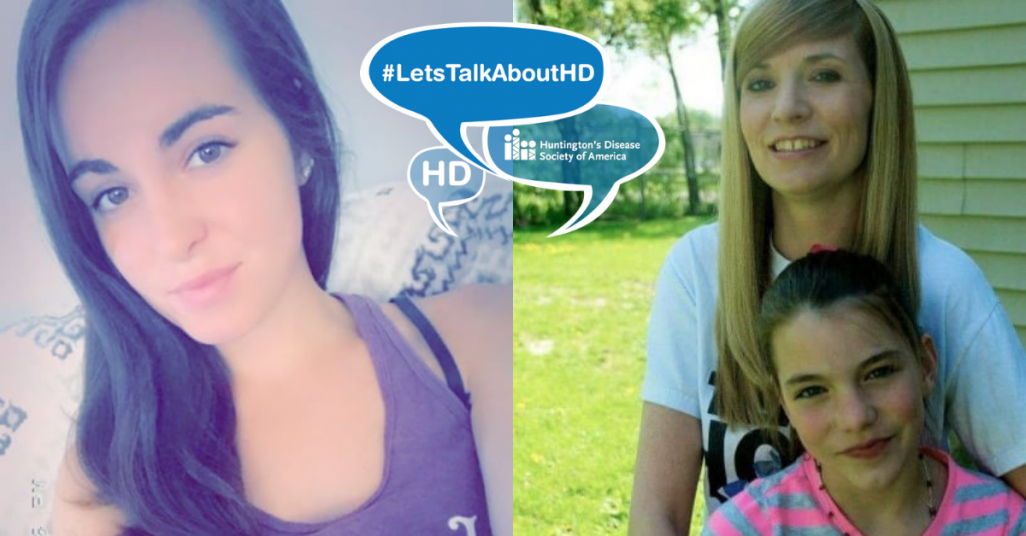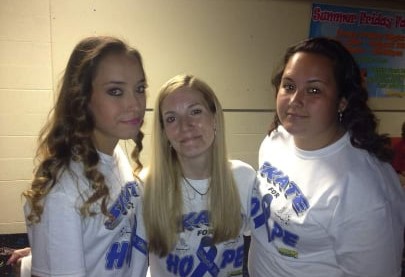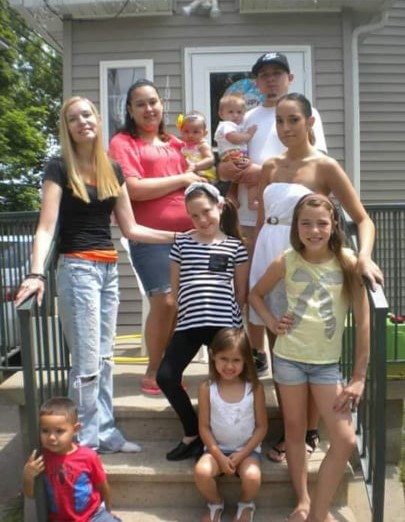
By Matthew Santamaria (msantamaria@hdsa.org)
At just 8-years-old, Michigan resident Chelsea Lee and her sisters helped care for her grandmother who was diagnosed with Huntington’s disease (HD).
HD is a fatal genetic disorder that causes the progressive breakdown of nerve cells in the brain. It deteriorates a person’s physical and mental abilities during their prime working years and has no cure.
"My grandmother’s HD symptoms included twitching, chorea, and developed speech problems,” said Chelsea.
The symptoms of HD are described as having ALS, Parkinson’s, and Alzheimer’s – simultaneously. Symptoms include personality changes, mood swings, depression, forgetfulness, impaired judgment, unsteady gait, involuntary movements, slurred speech, difficulty in swallowing, and significant weight loss.
Chelsea’s mother also tested positive for HD. Every child of a parent with HD has a 50/50 chance of inheriting the faulty gene. When her parents were divorced, Chelsea lived with her father, but she moved back in with her mother to be her caregiver.
“Throughout high school, I would grow up rather quickly as I would help with cooking and driving my mother around,” Chelsea explains. “My mother now resides in Florida with my aunt as the main caregiver.”

When her grandmother was in a nursing home, they were forced to cover the floor with mattresses because she kept moving and falling off the bed. After an incident with her grandmother, Chelsea got the impulse to be tested for HD.
The decision to get genetically tested is difficult to make. Each year, 5-10% are tested. It is never the right or wrong decision to be tested. There are people that see no benefit in knowing that they will develop the disease while others want to know in order to make informed choices about their future. It can take up to several weeks to receive your results from the genetic testing center.
At age 25-years-old, Chelsea tested positive for HD.
"I had a feeling I may have HD because of possible HD symptoms,” said Chelsea. "I dealt with the news well, but this would hit the family hard.”
In her local area, honoring her mother, Chelsea holds Skate For A Cure to raise awareness and to show that nobody is alone in the fight against HD. In 2021, on August 27th, Chelsea’s mother passed away.

“She was an amazing woman with a massive heart,” said Chelsea. “She loved all of her family and friends so much. She had such a special love for her grandbabies. She will forever be remembered, loved, and missed. We need a cure for HD! Too many people are losing their lives to this awful disease!”

###
Huntington’s disease (HD) is a fatal genetic disorder that causes the progressive breakdown of nerve cells in the brain. It deteriorates a person’s physical and mental abilities during their prime working years and has no cure. Every child of a parent with HD has a 50/50 chance of inheriting the faulty gene. Today, there are approximately 41,000 symptomatic Americans and more than 200,000 at-risk of inheriting the disease. The symptoms of HD are described as having ALS, Parkinson’s and Alzheimer’s – simultaneously.
The Huntington’s Disease Society of America is the premier nonprofit organization dedicated to improving the lives of everyone affected by HD. From community services and education to advocacy and research, HDSA is the world’s leader in providing help for today and hope for tomorrow for people with HD and their families.
HDSA was founded in 1967 by Marjorie Guthrie, the wife of legendary folk singer Woody Guthrie. Woody died from HD complications when he was only 55 years old, but the Guthrie family legacy lives on at HDSA to this day.
To learn more about Huntington’s disease and the work of the Huntington’s Disease Society of America, visit www.HDSA.org or call 1(800)345-HDSA.
This is a story featuring a personal experience with Huntington’s disease. If you would like to have your story told please contact Matthew Santamaria at msantamaria@hdsa.org
At just 8-years-old, Michigan resident Chelsea Lee and her sisters helped care for her grandmother who was diagnosed with Huntington’s disease (HD).
HD is a fatal genetic disorder that causes the progressive breakdown of nerve cells in the brain. It deteriorates a person’s physical and mental abilities during their prime working years and has no cure.
"My grandmother’s HD symptoms included twitching, chorea, and developed speech problems,” said Chelsea.
The symptoms of HD are described as having ALS, Parkinson’s, and Alzheimer’s – simultaneously. Symptoms include personality changes, mood swings, depression, forgetfulness, impaired judgment, unsteady gait, involuntary movements, slurred speech, difficulty in swallowing, and significant weight loss.
Chelsea’s mother also tested positive for HD. Every child of a parent with HD has a 50/50 chance of inheriting the faulty gene. When her parents were divorced, Chelsea lived with her father, but she moved back in with her mother to be her caregiver.
“Throughout high school, I would grow up rather quickly as I would help with cooking and driving my mother around,” Chelsea explains. “My mother now resides in Florida with my aunt as the main caregiver.”

When her grandmother was in a nursing home, they were forced to cover the floor with mattresses because she kept moving and falling off the bed. After an incident with her grandmother, Chelsea got the impulse to be tested for HD.
The decision to get genetically tested is difficult to make. Each year, 5-10% are tested. It is never the right or wrong decision to be tested. There are people that see no benefit in knowing that they will develop the disease while others want to know in order to make informed choices about their future. It can take up to several weeks to receive your results from the genetic testing center.
At age 25-years-old, Chelsea tested positive for HD.
"I had a feeling I may have HD because of possible HD symptoms,” said Chelsea. "I dealt with the news well, but this would hit the family hard.”
In her local area, honoring her mother, Chelsea holds Skate For A Cure to raise awareness and to show that nobody is alone in the fight against HD. In 2021, on August 27th, Chelsea’s mother passed away.

“She was an amazing woman with a massive heart,” said Chelsea. “She loved all of her family and friends so much. She had such a special love for her grandbabies. She will forever be remembered, loved, and missed. We need a cure for HD! Too many people are losing their lives to this awful disease!”

Chelsea has a message for the HD Community:
“Stay positive through it all. You need to find the little things
to smile about and to be thankful for.”
“Stay positive through it all. You need to find the little things
to smile about and to be thankful for.”
###
Huntington’s disease (HD) is a fatal genetic disorder that causes the progressive breakdown of nerve cells in the brain. It deteriorates a person’s physical and mental abilities during their prime working years and has no cure. Every child of a parent with HD has a 50/50 chance of inheriting the faulty gene. Today, there are approximately 41,000 symptomatic Americans and more than 200,000 at-risk of inheriting the disease. The symptoms of HD are described as having ALS, Parkinson’s and Alzheimer’s – simultaneously.
The Huntington’s Disease Society of America is the premier nonprofit organization dedicated to improving the lives of everyone affected by HD. From community services and education to advocacy and research, HDSA is the world’s leader in providing help for today and hope for tomorrow for people with HD and their families.
HDSA was founded in 1967 by Marjorie Guthrie, the wife of legendary folk singer Woody Guthrie. Woody died from HD complications when he was only 55 years old, but the Guthrie family legacy lives on at HDSA to this day.
To learn more about Huntington’s disease and the work of the Huntington’s Disease Society of America, visit www.HDSA.org or call 1(800)345-HDSA.
This is a story featuring a personal experience with Huntington’s disease. If you would like to have your story told please contact Matthew Santamaria at msantamaria@hdsa.org
